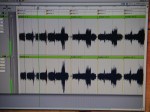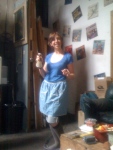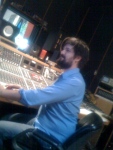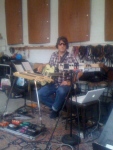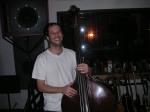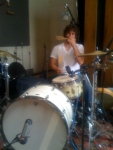clare burson
silver and ashsilver and ash debut
the show debuted at joe’s pub in new york last night to a sold out crowd. it was an amazing experience for me for too many reasons to go into right this minute. more on that later. in the meantime, here’s an excerpt from a review of the show written for nextbook by jesse oxfeld:
It’s a jarring experience at first, hearing stories of Kristallnacht, songs of lost family, memories of lost lives, while standing cheek-by-jowl at a packed bar, tumbler of Scotch in hand. And it’s unexpected to hear these things from a sultry-voiced indie-rock chick with guitar slung over her shoulder and backed by a quartet of guitarist, bassist, drummer, and electronic-gadget-player. But, soon enough, you realize that it works. The songs are lovely, and evocative, and you begin to think of Europe’s lost Jewry—of Burson’s grandmother’s lost childhood, and lost family— not as distant, sepia-toned artifacts but actual people, with immediate troubles.
Burson’s great-grandparents, planning to join their daughter in the United States, had packed up all their belongings to ship across the Atlantic as they themselves headed to Latvia, unable to get a visa. (The Wehrmacht, unfortunately, got to Latvia not too much later.) The boat containing their things, their lives and memories, was bombed before it left Europe. Near the end of her set, Burson sings of them: “Bluegreen and dappled spidery light/white wedding china/cut crystal glasses/a trunk of old linens/silver that’s tarnished/at home in the sea.” It’s a bracing new way of telling the stories we must continue to hear.
for the full article, go here.
silver and ash on wnyc
i had the opportunity today to talk on wnyc’s soundcheck program with john schaefer. he asked me questions, i answered, and then i played a few tunes from the new album with my friend hans holzen on electric guitar. to hear the interview, click here.
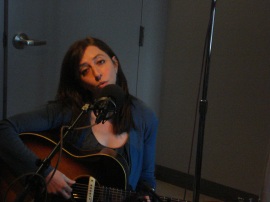
at wnyc studios - photo by hans holzen
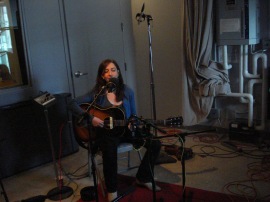
at wnyc studios - photo by hans holzen
- photo by hans holzen
debut
this isn’t an entry so much as it is an announcement:
the multi-media performance piece created around the SILVER AND ASH song cycle will debut in new york at JOE’S PUB on THURDSAY, FEBRUARY 26th @ 7:30PM.
the official blurb about the project and the show is (for now) as follows:
After releasing 2 full length albums to critical acclaim, indie chanteuse Clare Burson has created her most ambitious project yet – a song cycle, multi-media performance, and a collaborative artist book – one that imagines her grandmother’s life in Germany, from her birth in 1919 to her escape in 1938. Thanks to a generous grant from the Six Points Fellowship For Emerging Jewish Artists, Burson has written 10 songs that inhabit and give life to this story as well as Burson’s own struggles with rupture, silence, guilt, empathy, and continuity.
The album, entitled SILVER AND ASH and produced by Grammy nominated Tucker Martine (The Decemberists, Laura Veirs, Bill Frisell), is inspired by a desire for melodic minimalism, evocative imagery and subtle metaphors. From the first track to the last, distant pianos, jarring Telecasters, vintage acoustic guitars, Burson’s own lush string arrangements and rich vocals – at times wistful, at times full of desperation, but at all times direct – come together to fill the 10 songs on SILVER AND ASH with nostalgia and longing.
In a live setting, the SILVER AND ASH song cycle is transformed into a multi-media performance piece in which dream sequences and cinematic musings tell a coming of age story spanning centuries and continents. In advance of the album’s summer 2009 release, audience members at the Joe’s Pub debut of SILVER AND ASH will receive a free sampler of the album as well as a collaborative artist book created in response to the songs.
1995-1996
1995-1996.
my first year in germany was an archeological expedition – in terms of uncovering the lives of my grandparents and great grandparents but also in terms of beginning to uncover the extent of my own entanglement with this buried inheritance. in studying german and german history in college and going to germany to live, i wanted to connect with the country that had shaped my grandparents, and, in turn, shaped my mother and me. i wanted to understand the societal relationships that existed in the past and the ones that did and could exist in the present and future.
i was very much alone during my year in germany, but i did end up with a network of friends who became guides of a sort as i muddled through the year. one of these guides was gottfried, a colleague at the fritz bauer institute in frankfurt. the fritz bauer institute is a research and documentation center dedicated to the history of the holocaust and its continued impact on contemporary society. i was an intern in the education department, learning about how the holocaust is taught to german school children.
a week or so into my internship, gottfried, who split his time between the institute and teaching high school, invited me to join him and his class on a trip to buchenwald, i jumped at the chance. i would be a couple of years older than the kids on the trip. i would be the only american. i would be the only jew. we would stay for one day and two nights in former ss barracks that are now used to house and give workshops to school groups visiting the camp.
the morning that we toured the camp was bitter cold. the wind cut through my thick wool pea coat. the frost on the trees was heavier than any i had seen. the structures left at the camp seemed to frame a vast space of emptiness – a field of black and grey pebbles and dirt stretching into the frosted forest beyond. i remember the word ‘nichts’ (german for ‘nothing’) repeating itself in my head.
there were five minutes early in our tour during which our guide talked to us outside in the empty field that once had been the camp’s roll call area. he gave us an introductory history of the camp and some details concerning what had happened there. we huddled together, heads down, listening.
at that moment and thinking back on it now, it seemed like we were all essentially involved in the same process of trying to understand and come to terms with something that only confounds. it felt like we were all on the edge of a deep abyss, looking down into nothingness. we stood on different sides of the abyss, them and me, the germans and the jew, yet the choice confronting us was the same: dive in, walk away or become paralyzed at the edge, unable to act.
long way down
it’s a long way down
look out the window
fields blur by
bare from the harvest
blackbirds fly
it’s a long way down
arrive by the river
bright and strange
dirt roads to nowhere
far-off places
it’s a long way down
confused conversation
thick slow words
waiting for letters
but noone’s heard
distract me
don’t ask me
it’s a long long long way down
***
in december of 1938, shortly after arriving in the united states, my grandmother and her brother took a train from new york to their new home in memphis, tn. one Saturday afternoon in early 2008, i called and asked her to tell me about the train ride and her first impressions of her new life. 9 times out of 10, when i ask my grandmother for details about her childhood in germany or her departure from there, her response is, “i don’t remember, clare. it was so long ago.” but every once in a while, especially when i am particularly relentless with my questioning, she will surprise me, and herself . . .
***
it was december when we left new york for memphis. i came from germany, a cold country where december is a cold month. but here, in america, we travelled by train through areas where children played outside in short skirts and short pants and no jackets like it was springtime!
i remember how long it took to get there. it was such a long train trip to memphis. nobody goes by train any more, but in those days, that was the only way, and it took us a day and a half! i just couldn’t imagine anything being so far away. and that’s only a portion of the united states! it was such a long way down!
once we got to memphis, i really don’t remember who picked us up or who introduced us to whom. there were so many people. my experience was one of a whole new beginning – something very thrilling when you are so young. it wasn’t like our mother had said, ‘okay, next week you leave home for a new life in the united states.” we had to wait a long time to leave germany, many many months and there was so much excitement in the fact that it was finally happening. i’m sure people felt quite sorry for us. it was a sad thing, what we left behind. but there are so many different sides to one happening, and everybody was lovely and helpful and nice.
***
after she was finished, she laughed and asked if i was going to write a song with what she had told me.
altered images
over the past couple of months, i’ve turned my attention from songwriting to script writing and photoshopping. i have been working with a wonderful woman, jill samuels, who, in her role as dramaturge/ acting coach/ cheerleader is helping me craft a coherent narrative out of the storied silence documented by this blog. i have also been futzing around with photoshop, which has been pretty exciting. below are some photos i have been playing with as of late . . . enjoy!
the world turns on a dime
at a small café
in a big city
sits a man with his life in his hands
watch the nod of his head
his eyes, heavy-lidded
cause the world turns on a dime
there’s a girl
with a smile
on a boat with her brother
sailing for a visit of a year
she says goodbye to her home
and all things familiar
cause the world turns on a dime
take a train
back and forth
over the border
with suitcases piled overhead
will the officer scowl and stop before passing
will he stop before passing
cause the world turns on a dime
****************
at some point in the late 1870’s and after years of study and hard work, young yehezkel wainman (my great great grandfather) acquired all of the necessary papers to begin medical school. so one day, with papers in hand, he went to register with the appropriate authorities.
along the way, yehezkel stopped at a café for a cup of coffee or to meet a friend. while he was waiting, he fell asleep. maybe he had traveled from his home to register and was tired from a long journey. maybe his friend kept him waiting. either way, the coffee didn’t do the trick.
while he was sleeping, someone stole his papers. there were no other copies. crazy to imagine a world without xerox machines or computers . . . anyway, without the papers, there was no medical school. so back he went, to pushville, in kovne guberniia, and opened an inn.
******************
a year or so ago, my aunt showed me an old photo album she had recently unearthed. in it were pictures of my grandmother and her brother from the first few years after arriving in the united states. the album begins on the boat taking them from england to new york city.
i was struck by how happy they looked, my grandmother and her brother, how carefree. my grandmother strolled arm in arm with a handfull of different young men. she was stylish, in heels and a smartly tailored coat. her stunning smile belied nothing of the grim reality: she and her brother left germany on november 9, 1938, the morning of krystallnacht, and said goodbye to their parents in the chaos of the leipzig train station.
******************
elsewhere in this blog i have written about my grandfather’s escape from nazi germany: my grandfather, eric, was in retail or manufacturing – i forget which. anyway, planning his escape, he took the train to rotterdam and back again to berlin countless times, on ‘buying’ trips. on weekends, eric carted luggage full of his belongings to holland, where he left the contents with friends. he then would return to germany with empty suitcases. a dangerous proposition, what with nazi soldiers monitoring travel. these trips stopped when he was approached by a hostile officer inquiring as to why he was returning to berlin with an empty suitcase. somehow, granddaddy talked his way out of a potentially damning situation and made it out of germany shortly thereafter.
the devil’s arithmetic
when i was somewhere around 12 or 13 years old, i read ‘the devil’s arithmetic’ by jane yolen. it was one of many similarly-related books towards which i gravitated at the time, one of many young-adult novels searching for a sensitive approach to the hard and biting reality of the holocaust. i devoured it in no time but forgot about it as soon as i moved on to the next book.
8 or so years later, sitting in a park in hamburg, germany, i remembered the book. it was another cold and grey day in a string of cold and grey german days. spring was around the corner but decidedly not yet arrived. i was alone in a new city, as i often was during that year.
as i sat, homesick and generally blue, i wondered again why i had decided to spend an entire year in what for me was such a dark place. more important, it was far from and wholly without connection to everyone and everything i knew and loved. with each day i spent in europe, i felt further removed from the world around me. college friends up and moved to the west coast. childhood friends got engaged and married. my paternal grandfather passed away.
yet on that day, for some reason, it became clear to me that the decision to move to germany was far more of a decision to get closer to something than it was a decision to leave something behind. the longer i spent in germany, the more i was becoming connected to a world long buried by time and earth – looking for and sometimes finding hidden passageways or some sort of talisman that would allow me to slip back and forth through time. a fountain pen purchased at a junk store neighboring the cemetery in berlin in which my great grandfather is buried. an old postcard. the turn of a particular cobblestone street. a doorway.
and then i remembered jane yolen’s book. set in the 1980’s, the story opens with the protagonist, hannah, at her family’s passover seder. bored and annoyed with relatives’ stories of the past, hannah gets up to open the door for elijah. when she does so, she looks out, not upon her familiar suburban street, but upon a field in a small polish village in 1942.
i could no longer recall specifics about the plot. what i could remember was that hannah experiences the horrors of the next few years along side of the people her grandparents spoke about during passover seders. i also remembered that hannah eventually returns to her grandparents’ living room just as she is sent to the gas chambers.
thinking back on the book, i was struck by a feeling of envy. strange, i know. what’s to envy? but that is what i felt. i envied hannah’s experience – viscerally. not because hannah has the opportunity to change history in this book. she decidedly does not. and even if she were to, i am under no illusions that i ever could or should or would change the past. (it has not escaped my attention that were it not for the arrival of hitler on the world scene and the subsequent flight of my grandparents from germany, i wouldn’t be here today.) however, my body ached from not having the opportunity hannah does have in the book – to meet and develop relationships with people whose lives did not cross over into the present. and how unfair that i, unlike hannah, could not truly empathize with the experiences of my grandparents. i wasn’t there. how could i know what it was like? to leave everyone and everything you knew and loved? how could i know what it was like to lose your parents as a teenager? to the whims of history. how could i truly understand the trauma of rupture and the process of starting over? how could i help shoulder the burden of this history when i didn’t experience it myself?
and then it became clear to me that this was at least part of my motivation for going to germany, for studying history in school, learning yiddish, pouring over old photographs, and now, working on this recording project – this desire to insinuate myself into the past, to go beyond assimilating my grandparents’ stories and silences and experience them as my own. it was my attempt at time travel. and perhaps, time travel, however literal or figurative, was and still is my means to empathy, care, and purpose.
(over the course of writing songs for this new recording, i have noted to myself and others that time travel isn’t a new point of fascination for me. i don’t think it’s purely coincidental that one of my favorite t.v. shows in high school was quantum leap. (i can sing the theme song in its entirety on the drop of a dime.) there is something immensely appealing about dr. sam beckett, who, to quote the opening credits, ‘finds himself leaping from life to life, putting things right that once went wrong.’)
anyway, clearly working on this project has unearthed thoughts about ‘the devil’s arithmetic’ yet again. so today i stopped by a bookstore in my neighborhood to buy a new copy of the book. holding it in my hands again after 20 years was a strangely powerful sensation. and more powerful still was the feeling i had upon reading the synopsis on the back of the book and re-discovering that hannah’s hebrew name in the book is the same as mine: chaya.
video from the studio
more little glimpses from the studio – in the first clip, i play the earliest version of ‘i will/ with you’ for the band at excello studio – in the second, i dance to mark’s u2 version, which was ultimately replaced with totally new wave-y keyboard riffs – in the third, meet doctor clare, guitar repair master!
in the studio
just a little note to say that recording has begun. i offer another glimpse into the world behind the songs:
this is what ‘magpies’ looks like on the computer – kind of looks like a flock of . . . magpies!
i am dressing the studio salad – in an apron – photo by andy cotton
producer, tucker martine, is smiling
mark spencer, in shades, surrounded by all sorts of stringed things – photo by andy cotton
andy cotton smiles
tony leone loves to play the drums with spatulas – photo by andy cotton
more pictures here.


